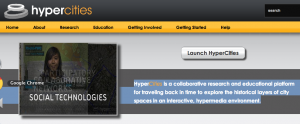Why should we be interested in old ship’s logs? Well this site reveals how the detailed 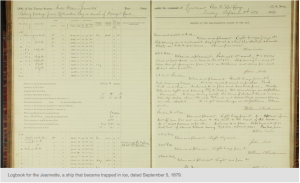 records kept about weather in ships’ logs can help give us information about climate change. Listen to this radio segment on the site, interviewing the transcribers of the logs.
records kept about weather in ships’ logs can help give us information about climate change. Listen to this radio segment on the site, interviewing the transcribers of the logs.
Author: Katie Faull
Dr. Katherine Faull is Professor of German and Humanities at Bucknell University, Lewisburg, PA. Author and editor of six book-length publications, over 40 peer-reviewed articles and chapters, she was educated at King's College, London (BA Hons, German/Russian) and Princeton University (Germanic Languages and Literatures), and is a Life Member of Clare Hall, University of Cambridge. The recipient of three major grant awards from the National Endowment for the Humanities, she has published extensively on questions of gender, race, and autobiography in the Moravian Church in North America in the colonial period. She serves on the editorial board of the Journal of Moravian History, the book series, Anabaptist and Pietist Studies with the Pennsylvania State University Press, and is also a member of the Board of Directors of the Moravian Archives, Bethlehem, PA. Her current international collaborative DH project, Moravian Lives, focuses on the digital exploration of Moravian memoirs (moravian.bucknell.edu) and brings together top international scholars in the field of Pietism with graduate and undergraduate students in the exploration of 18th-century life writing, gender, race, and the Moravian world. Katie has also published scholarly articles on digital pedagogy at a liberal arts institution, DH and religious history, and digital visualization in the humanities.
For more, go to http://www.katiefaull.com
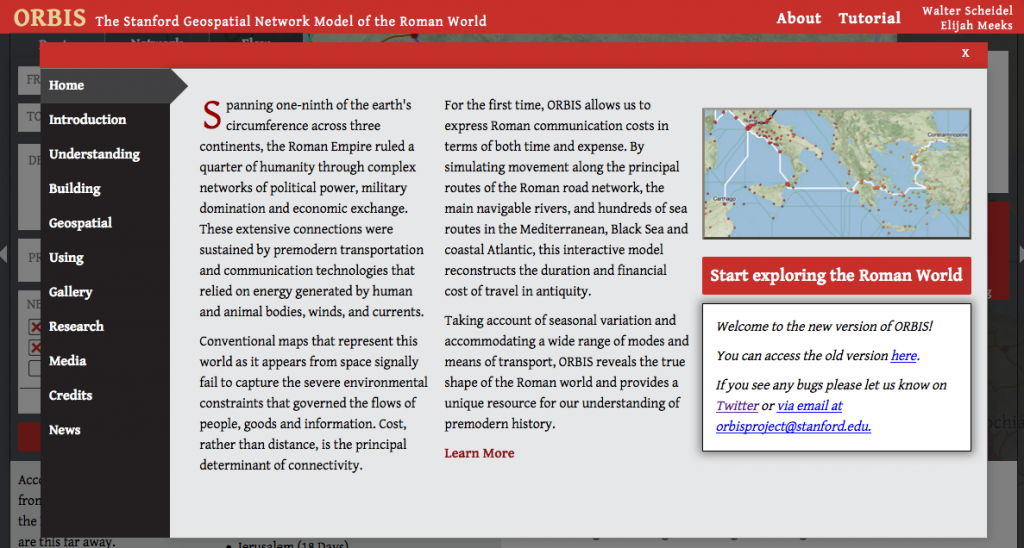
The Stanford Geospatial Network Model of the Roman World
About the Project
(excerpted from the project website)
The Stanford Geospatial Network Model of the Roman World reconstructs the time cost and financial expense associated with a wide range of different types of travel in antiquity. The model is based on a simplified version of the giant network of cities, roads, rivers and sea lanes that framed movement across the Roman Empire. It broadly reflects conditions around 200 CE but also covers a few sites and roads created in late antiquity.
Electronic Enlightenment
Electronic Enlightenment (database available through Bertrand Library)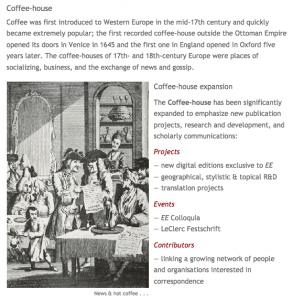
Electronic Enlightenment — letters & lives online
. . . reconnecting the first global social network!
Electronic Enlightenment is the most wide-ranging online collection of edited correspondence of the early modern period, linking people across Europe, the Americas and Asia from the early 17th to the mid-19th century — reconstructing one of the world’s great historical “conversations”.
Hypercities
Lincoln at 200
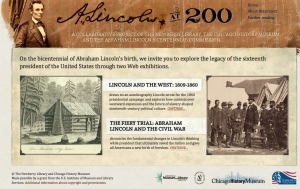
A Collaborative Project of the Newberry Library, the Chicago Museum, and the Abraham Lincoln Bicentennial Commission.

About the Project
(excerpted from project website)
Lincoln at 200 is a collaborative project of the Abraham Lincoln Bicentennial Commission, the Chicago History Museum, and the Newberry Library. The Institute for Museum and Library Services has generously provided funding for this Web exhibition as part of a series of initiatives to commemorate the Lincoln bicentennial. All three institutions collaborated in planning public programs in Chicago for the bicentennial year. Eileen Mackevich, executive director of the Abraham Lincoln Bicentennial Commission, initiated the discussions that led to this collaboration. We are grateful to her and to Jennifer Rosenfeld, deputy executive director of the Bicentennial Commission, for their energetic and collegial participation in this initiative.
